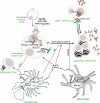Innate pathways to B-cell activation and tolerance
- PMID: 20146708
- PMCID: PMC3422021
- DOI: 10.1111/j.1749-6632.2009.05123.x
Innate pathways to B-cell activation and tolerance
Abstract
B cells represent an important link between the adaptive and innate immune systems as they express both antigen-specific B-cell receptors (BCRs) as well as various Toll-like receptors (TLRs). Several checkpoints in B-cell development ensure that self-specific cells are eliminated from the mature B-cell repertoire to avoid harmful autoreactive responses. These checkpoints are controlled by BCR-mediated events but are also influenced by TLR-dependent signals from the innate immune system. Additionally, B-cell-intrinsic and extrinsic TLR signaling are critical for inflammatory events required for the clearance of microbial infections. Factors secreted by TLR-activated macrophages or dendritic cells directly influence the fate of protective and autoreactive B cells. Additionally, naive and memory B cells respond differentially to TLR ligands, as do different B-cell subsets. We review here recent literature describing intrinsic and extrinsic effects of TLR stimulation on the fate of B cells, with particular attention to autoimmune diseases.
Figures

References
-
- Goodnow CC, et al. Cellular and genetic mechanisms of self tolerance and autoimmunity. Nature. 2005;435:590–597. - PubMed
-
- Hostmann A, et al. Peripheral B cell abnormalities and disease activity in systemic lupus erythematosus. Lupus. 2008;17:1064–1069. - PubMed
-
- Yanaba K, et al. B-lymphocyte contributions to human autoimmune disease. Immunol Rev. 2008;223:284–299. - PubMed
-
- Ding C, Yan J. Regulation of autoreactive B cells: checkpoints and activation. Arch Immunol Ther Exp (Warsz) 2007;55:83–89. - PubMed
-
- Nemazee DA, Burki K. Clonal deletion of B lymphocytes in a transgenic mouse bearing anti-MHC class I antibody genes. Nature. 1989;337:562–566. - PubMed
Publication types
MeSH terms
Substances
Grants and funding
LinkOut - more resources
Full Text Sources

